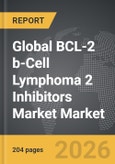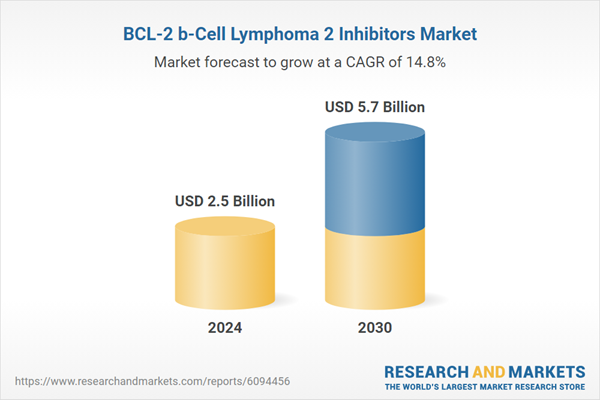Global BCL-2 (B-cell Lymphoma 2) Inhibitors Market - Key Trends & Drivers Summarized
Why Are BCL-2 Inhibitors Emerging as a Breakthrough in Targeted Cancer Therapy?
BCL-2 (B-cell lymphoma 2) inhibitors are rapidly gaining recognition as a revolutionary class of targeted therapeutics in the oncology landscape, owing to their ability to directly address the mechanisms of cancer cell survival and resistance. The BCL-2 protein family plays a central role in regulating apoptosis, the programmed cell death process, which is often disrupted in malignancies such as chronic lymphocytic leukemia (CLL), acute myeloid leukemia (AML), and certain lymphomas. Overexpression of BCL-2 enables cancer cells to evade death, contributing to tumor persistence and resistance to conventional chemotherapy. Inhibitors like venetoclax, the first FDA-approved BCL-2-targeting drug, selectively bind to the BCL-2 protein and restore the apoptotic process, effectively driving cancer cells to self-destruct. This novel mechanism has shown significant clinical efficacy, particularly in hematologic malignancies, and is being explored for its potential in solid tumors as well. The specificity of BCL-2 inhibitors means fewer off-target effects and better patient tolerance, addressing a long-standing issue with cytotoxic therapies. Moreover, their use in combination with existing regimens - such as hypomethylating agents, monoclonal antibodies, or BTK inhibitors - has further amplified their therapeutic potential, enabling more comprehensive cancer control. As oncology increasingly embraces precision medicine, BCL-2 inhibitors are positioned as front-runners in the push toward more effective, individualized treatment strategies that disrupt the molecular underpinnings of cancer.How Are Scientific Advancements and Clinical Trials Expanding the Potential of BCL-2 Inhibitors?
Ongoing scientific research and expanding clinical trial data are significantly broadening the therapeutic scope and clinical confidence in BCL-2 inhibitors. Venetoclax has spearheaded a new wave of research initiatives, and its success has fueled further investigation into next-generation BCL-2 inhibitors with improved safety profiles, broader efficacy, and the ability to overcome resistance mechanisms. Researchers are delving into the structural nuances of BCL-2 family proteins - including MCL-1 and BCL-XL - which often interact with BCL-2 in complex signaling networks that influence cell fate. This has led to exploration of dual and selective inhibitors that can modulate multiple targets within the apoptosis pathway, potentially offering superior outcomes in refractory and relapsed cancers. Parallel efforts are focused on understanding the genetic and molecular markers that predict responsiveness to BCL-2 inhibition, which could pave the way for highly personalized treatment plans. Clinical trials are also investigating expanded indications, including non-Hodgkin lymphoma, multiple myeloma, breast cancer, and lung cancer, with early-phase data suggesting promising efficacy when used in targeted combinations. Advances in pharmacodynamics and drug formulation are addressing initial challenges such as tumor lysis syndrome and hematologic toxicity, enhancing both the safety and scalability of these treatments. Furthermore, the use of real-world evidence and biomarker-driven patient stratification is helping to refine dosage schedules and identify optimal therapeutic windows. The convergence of high-throughput screening, AI-driven drug design, and immune-oncology research is expected to further accelerate the evolution of BCL-2 inhibitors from niche therapeutics to mainstream oncologic standards of care.What Market Dynamics and Healthcare Trends Are Driving Global Demand for BCL-2 Inhibitors?
The global demand for BCL-2 inhibitors is being shaped by a confluence of oncology market dynamics, demographic trends, and systemic healthcare shifts toward precision medicine and value-based care. One of the most influential drivers is the growing incidence of hematological malignancies worldwide, particularly among aging populations, who often have limited tolerance for aggressive chemotherapy regimens. BCL-2 inhibitors, with their targeted approach and generally favorable safety profile, are emerging as preferred options for elderly and frail patients. As healthcare systems globally adopt cancer care models centered around early detection and tailored therapies, molecular testing is becoming routine practice, facilitating the identification of patients who may benefit from BCL-2 inhibition. Additionally, the increasing emphasis on outpatient cancer management is boosting demand for oral oncology drugs like venetoclax, which offer convenience and reduce hospital burden. From a commercial perspective, pharmaceutical companies are investing heavily in R&D and licensing deals to expand their oncology portfolios with BCL-2-targeting molecules. Collaborations between biotech firms and academic research institutions are yielding new therapeutic candidates and accelerating trial pipelines. Regulatory agencies, recognizing the urgent need for innovation in difficult-to-treat cancers, are granting fast-track, orphan drug, and breakthrough therapy designations to promising BCL-2 inhibitors, further streamlining their market entry. Meanwhile, patient advocacy and awareness campaigns are helping to educate patients about novel treatment options, increasing uptake and adherence. Market access and reimbursement models are also evolving to support advanced, high-cost therapies that demonstrate measurable value in survival and quality of life outcomes. These intertwined trends are collectively shaping a high-growth, innovation-driven landscape for BCL-2 inhibitors across global oncology markets.What Is Fueling the Growth in the Global BCL-2 Inhibitors Market?
The growth in the global BCL-2 inhibitors market is driven by several interconnected factors spanning scientific breakthroughs, clinical demand, pharmaceutical innovation, and patient-centric healthcare evolution. A core driver is the proven clinical efficacy of drugs like venetoclax in treating hard-to-manage hematological malignancies, particularly when combined with other targeted therapies or chemotherapeutic agents. As real-world data continues to validate and expand upon clinical trial results, oncologists are increasingly confident in prescribing BCL-2 inhibitors as frontline or second-line treatments. The increasing prevalence of cancer - particularly leukemias, lymphomas, and other hematologic disorders - continues to expand the addressable patient pool, especially in regions with aging populations and rising healthcare access. Pharmaceutical companies are responding with robust pipelines, strategic collaborations, and aggressive expansion into untapped geographic markets, particularly across Asia-Pacific, Latin America, and the Middle East. Regulatory support, in the form of accelerated review pathways and orphan drug incentives, is reducing time-to-market and fostering innovation. Furthermore, advances in diagnostic technologies such as next-generation sequencing (NGS) are enabling more precise identification of patients who are likely to respond to BCL-2-targeting therapies, thus driving targeted prescribing and minimizing trial-and-error approaches. Market competition is also intensifying, with emerging players and biosimilar developers entering the fray, potentially increasing accessibility and affordability over time. Reimbursement frameworks are adapting to support high-value therapies based on real-world outcomes, while healthcare providers are incorporating BCL-2 inhibitors into integrated cancer care protocols that emphasize patient quality of life and treatment tolerability. As these dynamics continue to align, the global BCL-2 inhibitors market is poised for sustained growth, driven by a unique combination of clinical impact, therapeutic precision, and global health priorities.Report Scope
The report analyzes the BCL-2 b-Cell Lymphoma 2 Inhibitors market, presented in terms of market value (US$). The analysis covers the key segments and geographic regions outlined below:- Segments: Therapy Type (Combination Therapy, Monotherapy); Type (Diffuse Large B-cell Lymphoma, Follicular Lymphoma, Chronic Lymphocytic Leukemia, Mantle Cell Lymphoma).
- Geographic Regions/Countries: World; United States; Canada; Japan; China; Europe (France; Germany; Italy; United Kingdom; Spain; Russia; and Rest of Europe); Asia-Pacific (Australia; India; South Korea; and Rest of Asia-Pacific); Latin America (Argentina; Brazil; Mexico; and Rest of Latin America); Middle East (Iran; Israel; Saudi Arabia; United Arab Emirates; and Rest of Middle East); and Africa.
Key Insights:
- Market Growth: Understand the significant growth trajectory of the Combination Therapy segment, which is expected to reach US$3.7 Billion by 2030 with a CAGR of a 16.1%. The Monotherapy segment is also set to grow at 12.5% CAGR over the analysis period.
- Regional Analysis: Gain insights into the U.S. market, valued at $680 Million in 2024, and China, forecasted to grow at an impressive 19.8% CAGR to reach $1.2 Billion by 2030. Discover growth trends in other key regions, including Japan, Canada, Germany, and the Asia-Pacific.
Why You Should Buy This Report:
- Detailed Market Analysis: Access a thorough analysis of the Global BCL-2 b-Cell Lymphoma 2 Inhibitors Market, covering all major geographic regions and market segments.
- Competitive Insights: Get an overview of the competitive landscape, including the market presence of major players across different geographies.
- Future Trends and Drivers: Understand the key trends and drivers shaping the future of the Global BCL-2 b-Cell Lymphoma 2 Inhibitors Market.
- Actionable Insights: Benefit from actionable insights that can help you identify new revenue opportunities and make strategic business decisions.
Key Questions Answered:
- How is the Global BCL-2 b-Cell Lymphoma 2 Inhibitors Market expected to evolve by 2030?
- What are the main drivers and restraints affecting the market?
- Which market segments will grow the most over the forecast period?
- How will market shares for different regions and segments change by 2030?
- Who are the leading players in the market, and what are their prospects?
Report Features:
- Comprehensive Market Data: Independent analysis of annual sales and market forecasts in US$ Million from 2024 to 2030.
- In-Depth Regional Analysis: Detailed insights into key markets, including the U.S., China, Japan, Canada, Europe, Asia-Pacific, Latin America, Middle East, and Africa.
- Company Profiles: Coverage of players such as Big Green Egg, Bradley Smoker, Broil King, Camp Chef, Char-Broil and more.
- Complimentary Updates: Receive free report updates for one year to keep you informed of the latest market developments.
Some of the 36 companies featured in this BCL-2 b-Cell Lymphoma 2 Inhibitors market report include:
- AbbVie Inc.
- Abcam plc
- Amgen Inc.
- Ascentage Pharma Group
- AstraZeneca plc
- BeiGene Ltd.
- Bio-Techne Corporation
- Biorbyt Ltd.
- Bristol Myers Squibb Co.
- F. Hoffmann-La Roche Ltd.
- Ipsen Pharma
- Merck & Co., Inc.
- Novartis AG
- Santa Cruz Biotechnology Inc.
- Seagen Inc.
- Servier Laboratories
- Zentalis Pharmaceuticals
- InnoCare Pharma Ltd.
- Eilean Therapeutics LLC
- BioLineRx Ltd.
This edition integrates the latest global trade and economic shifts into comprehensive market analysis. Key updates include:
- Tariff and Trade Impact: Insights into global tariff negotiations across 180+ countries, with analysis of supply chain turbulence, sourcing disruptions, and geographic realignment. Special focus on 2025 as a pivotal year for trade tensions, including updated perspectives on the Trump-era tariffs.
- Adjusted Forecasts and Analytics: Revised global and regional market forecasts through 2030, incorporating tariff effects, economic uncertainty, and structural changes in globalization. Includes historical analysis from 2015 to 2023.
- Strategic Market Dynamics: Evaluation of revised market prospects, regional outlooks, and key economic indicators such as population and urbanization trends.
- Innovation & Technology Trends: Latest developments in product and process innovation, emerging technologies, and key industry drivers shaping the competitive landscape.
- Competitive Intelligence: Updated global market share estimates for 2025, competitive positioning of major players (Strong/Active/Niche/Trivial), and refined focus on leading global brands and core players.
- Expert Insight & Commentary: Strategic analysis from economists, trade experts, and domain specialists to contextualize market shifts and identify emerging opportunities.
Table of Contents
Companies Mentioned (Partial List)
A selection of companies mentioned in this report includes, but is not limited to:
- AbbVie Inc.
- Abcam plc
- Amgen Inc.
- Ascentage Pharma Group
- AstraZeneca plc
- BeiGene Ltd.
- Bio-Techne Corporation
- Biorbyt Ltd.
- Bristol Myers Squibb Co.
- F. Hoffmann-La Roche Ltd.
- Ipsen Pharma
- Merck & Co., Inc.
- Novartis AG
- Santa Cruz Biotechnology Inc.
- Seagen Inc.
- Servier Laboratories
- Zentalis Pharmaceuticals
- InnoCare Pharma Ltd.
- Eilean Therapeutics LLC
- BioLineRx Ltd.
Table Information
| Report Attribute | Details |
|---|---|
| No. of Pages | 204 |
| Published | February 2026 |
| Forecast Period | 2024 - 2030 |
| Estimated Market Value ( USD | $ 2.5 Billion |
| Forecasted Market Value ( USD | $ 5.7 Billion |
| Compound Annual Growth Rate | 14.8% |
| Regions Covered | Global |









